2023 Great American Gardeners Awards
LIBERTY HYDE BAILEY AWARD
The American Horticultural Society’s highest award, the Liberty Hyde Bailey Award is given to an individual who has made significant lifetime contributions to at least three of the following horticultural fields: teaching, research, communications, plant exploration, administration, art, business, and leadership. First awarded in 1958.
This year’s winner of the AHS’s highest honor is Claire E. Sawyers, who has been director of the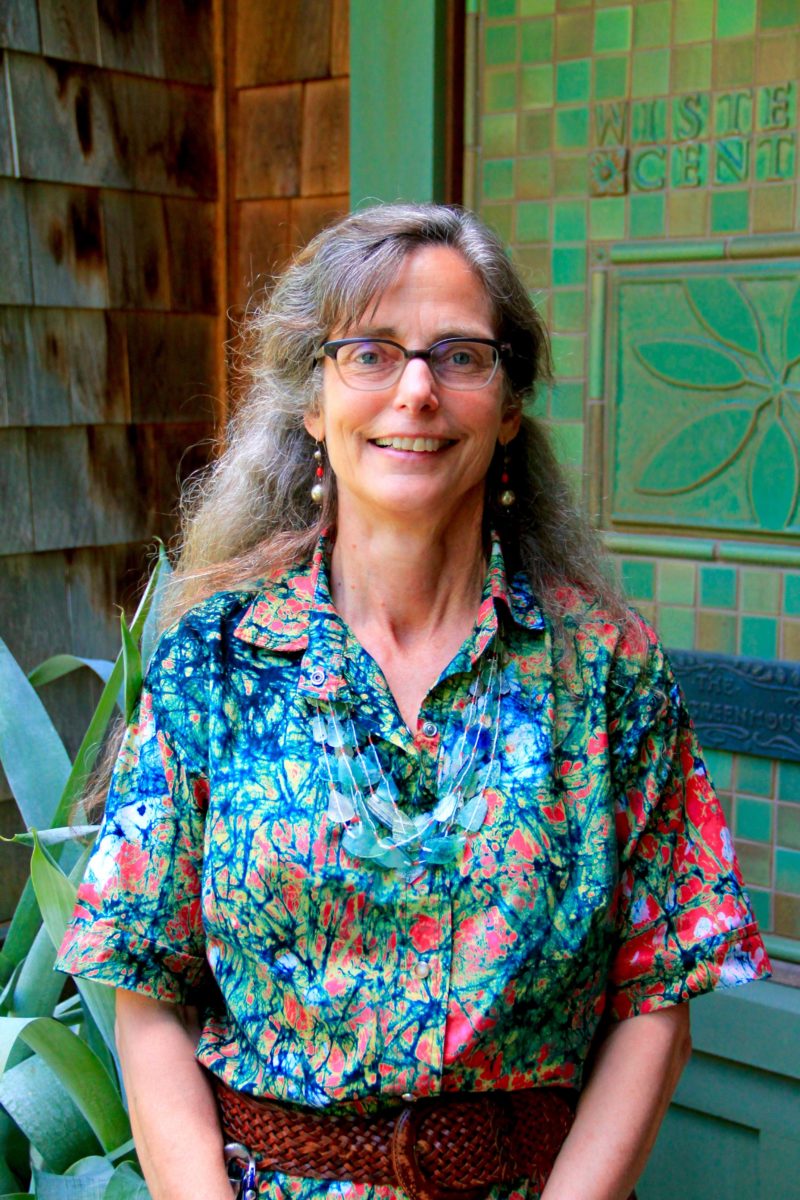 Scott Arboretum of Swarthmore College, located in the suburbs of Philadelphia, for more than 30 years. In addition to transforming the Arboretum into one of the leading examples of campus gardens in the country she has overseen its acclaimed Arthur Hoyt Scott Medal and Award program, which recognizes top American horticulturists.
Scott Arboretum of Swarthmore College, located in the suburbs of Philadelphia, for more than 30 years. In addition to transforming the Arboretum into one of the leading examples of campus gardens in the country she has overseen its acclaimed Arthur Hoyt Scott Medal and Award program, which recognizes top American horticulturists.
Sawyers has been active in publishing and other professional activities and has garnered a number of awards over the course of her career. Her book, The Authentic Garden: Five Principles for Cultivating Place was published by Timber Press in 2007. It received an AHS Book award in 2008. She served as guest editor for four of the Brooklyn Botanic Garden’s Handbook series, and she has also had more than 40 articles published in popular magazines, including The American Gardener, Horticulture, and Fine Gardening.
Her awards include the American Horticultural Society’s Professional Award (2009), The Garden Club of America, Zone V, Horticulture Commendation (2008), and the University of Delaware Presidential Citation for Outstanding Achievement (2001). She has served on boards or committees for many professional organizations.
“In a field often plagued by rapid turnover of leadership, Claire exemplifies what can be accomplished over time with devotion, commitment and vision,” says Panayoti Kelaidis, director of outreach at Denver Botanic Garden in Colorado. “As much as anyone else in public garden leadership, she has helped elevate the Delaware Valley to be America’s garden heartland.”
LESSONS FROM BEAN SEADS
Sawyers grew up on a farm in Missouri, where she learned about gardening from her first mentors, her grandparents. “My parents ran a dairy farm, so I spent days with my grandparents,” she recalls. “I remember feeling very empowered and grown up when they trusted me to plant bean seeds. Being in that environment was how my direction in life got set.”
Sawyers attended some classes at Purdue University the summer after her junior year in high school and suddenly found herself in college. “They enrolled me as a regular student even though I hadn’t graduated from high school,” says Sawyers, “so I sometimes refer to myself as a high school dropout with two master’s degrees.” She chose to enroll in Purdue’s professional plantsman program, overseen by legendary horticulturist Harrison Flint, who became another key mentor. “He was really instrumental in giving me direction, entrusting me to be one of his TAs,” says Sawyers.
After a brief sojourn in Europe, where Sawyers worked at the renowned Kalmthout Arboretum in Belgium as well as private gardens in Brittany and Normandy, she returned to Purdue for her master’s degree in horticulture. She then joined the Longwood Graduate Program at the University of Delaware, which at the time was coordinated by Richard Lighty. On graduation from the Longwood program in 1983, Sawyers followed Lighty as part of a three-person administrative team put together to steer the Mt. Cuba Center for Piedmont Plants in Hockessin, Delaware, during its transition from a private estate into a public garden. “It was a very diverse position that allowed me to gain experience in developing plant collections, plant records systems, volunteer programs, visitor services, and of course I learned a lot about native plants,” Sawyers recalls.
MOVING TO SCOTT
In 1990, Sawyers was hired to be the executive director of the Scott Arboretum. “Looking back, I was probably pretty green stepping into the position, so I do feel a deep sense of indebtedness to Bill Spock, who was vice president of Swarthmore at that time, for taking the chance on me,” she says.
It was a challenge to take on the administration and maintenance of a 400-plus acre campus with plant collections that include more than 3,000 woody taxa and a staff of 28 employees and some 200 volunteers. “Over 30 years she has used her organizational and administrative abilities to create what is arguably the most beautiful garden campus in North America,” says Lighty. “She has done this while maintaining the majestic feeling for which the campus has always been noted.” The arboretum is also known for its “outstanding plant collections, which have grown and flourished under Claire’s direction, including hollies, lilacs, and peonies. The holly collection is one of the finest in the world,” says Paul W. Meyer, recently retired as director of the Morris Arboretum of the University of Pennsylvania.
During her tenure, Sawyers was instrumental in leveraging a number of notable endowments and spearheaded the creation of the Wister Education Center and Greenhouse in 2009. And she helped elevate the stature of the Arboretum’s signature horticultural award program. “Claire has guided the Arthur Hoyt Scott Award and Medal with outstanding organization, grace, and fairness,” says Meyer. “Through this award program, which includes a significant cash prize, she has raised the prestige of horticulture professionals while recognizing outstanding leaders in the field.”
Sawyers has rich memories of hosting a who’s who of American horticulturists over the course of the award program, but one of her most poignant dates to her first year, in 1991, when the honoree was J.C. Raulston of North Carolina State University Arboretum. “This was a touchstone for me because during discussion by the committee the point was made that he was relatively young and no doubt we would have many years ahead to recognize his accomplishments,” Sawyers recalls. She reminded committee members that the award was not contingent on the age or stage of career of the recipient, but rather on who had made the most singular contributions to the science and art of gardening. Swayed by this, the committee selected Raulston who, tragically, died in an automobile accident in 1996. “If we had not given him the award that year, he might never have been recognized,” observes Sawyers.
ENGAGING THE STUDENTS
Sawyers says creating tangible and impactful ways to engage the college community in the Arboretum’s mission is where she feels the greatest sense of accomplishment. “The students that come to Swarthmore increasingly have had minimal contact with nature because many have been raised in an urban environment,” says Sawyers. Thus one of her goals became, “providing opportunities for students here to begin to have some plant literacy and an understanding of how we are a part of nature. “
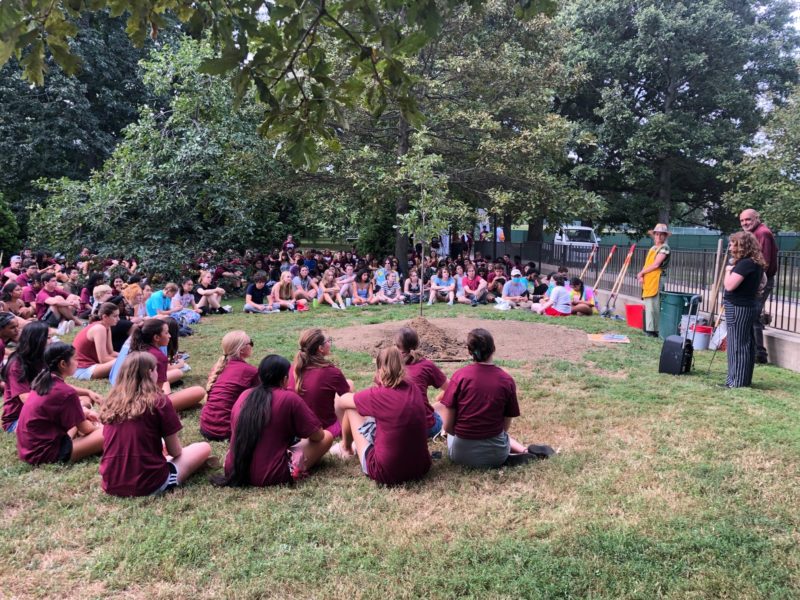 “The arboretum is thoroughly embedded with the college—our plant collections are all around the academic buildings,” she emphasizes. “So on the one hand you would think that, of course students are engaged, but now they walk to the classrooms on their phones not looking at the landscape.” To remedy this, six years ago Sawyers established a campus engagement coordinator—a dedicated staff position with the express goal of developing programs that pull students and faculty into the mission of the arboretum.
“The arboretum is thoroughly embedded with the college—our plant collections are all around the academic buildings,” she emphasizes. “So on the one hand you would think that, of course students are engaged, but now they walk to the classrooms on their phones not looking at the landscape.” To remedy this, six years ago Sawyers established a campus engagement coordinator—a dedicated staff position with the express goal of developing programs that pull students and faculty into the mission of the arboretum.
“We have established some things that feel like they are successful, such as ‘Discover at the Arboretum’, a series of popup events held in student lounges and the dining hall. “I would say this is what you might call fun horticulture—planting seeds, or making tea bags with chamomile grown in the gardens,” says Sawyers.
Last year the arboretum hosted a career night where three alumni involved in horticultural careers were invited speakers. “The idea is to make liberal arts majors aware of careers in horticulture,” says Sawyers. And the newest initiative, aided by a generous gift from an alumna, Janet Jones, is the creation of two core credit courses related to plants and horticulture—Human Culture and Plants, and Nature Rx—both housed in the Environmental Studies program. “To me this feels like a very meaningful way for the arboretum to say, here’s how we are able to contribute to the core mission of the college and expose students in a comprehensive way to learn about plants and our ties to horticulture,” says Sawyers.
EMERGING HORTICULTURAL PROFESSIONAL AWARD
Recognizes significant achievements and/or leadership that have advanced the field of horticulture in America. First given in 2017.
Alabama native Marcus Garner combines his love of people and horticulture as a horticulture urban regional Extension agent for Alabama Cooperative Extension System at Alabama A&M University in Huntsville. In addition to fielding phone calls from concerned homeowners about armyworms and other pests and teaching workshops on plant propagation and lawn care, Garner actively seeks out community organizations and facilities to assist clients in gaining self-sufficiency and better health through plants and gardening. 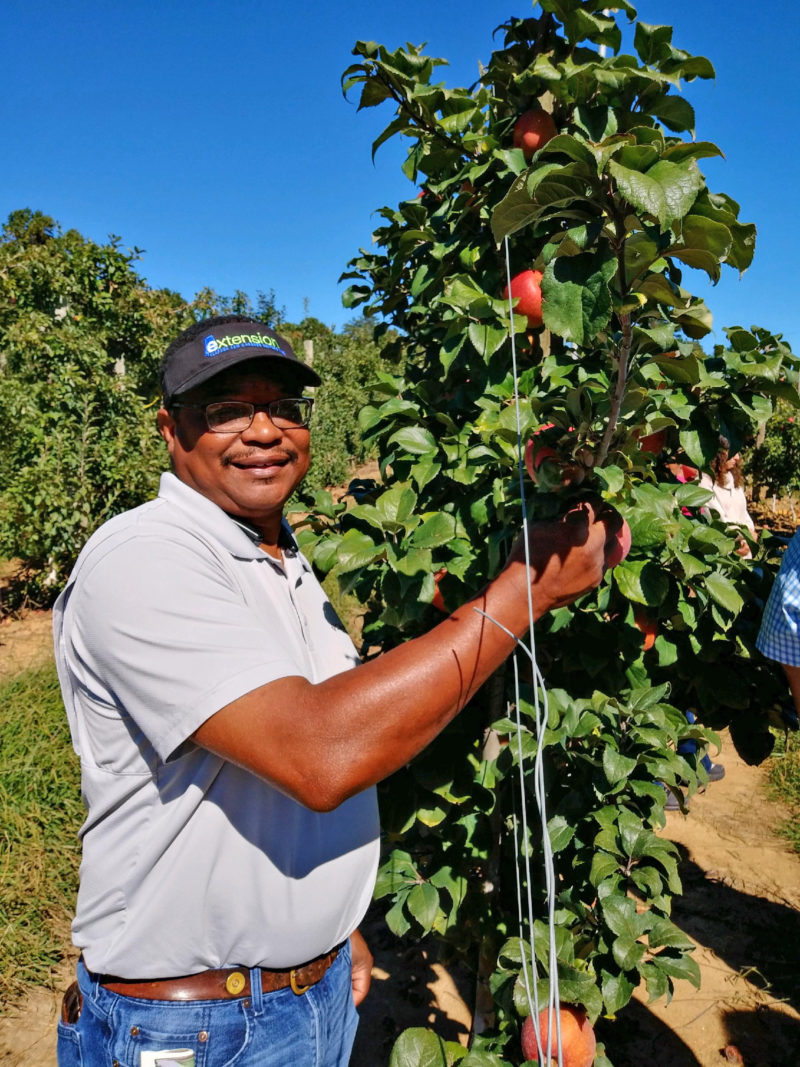
One of these organizations is the Legacy Center, a nonprofit that supports programs for older, disabled, and special needs adults and other underserved populations. Legacy’s executive director, Morgan Saintjones, says Garner “mobilized groups of over 100 volunteers to beautify our neighborhood gardens and the outdoor courtyards for low-income seniors.” Jennifer Bail, an assistant professor in the college of nursing at the University of Alabama in Huntsville, who worked with Garner during a cancer research project, says he “delivered gardening supplies and mentored participants in the planning, planting, and maintaining of a home vegetable garden.”
As an educator for the Water Wheels Mobile Conservation Laboratory—Alabama Extension’s traveling classroom—Garner crisscrosses Alabama teaching citizens about environmental stewardship. Through interactive activities and games, Garner makes learning about watersheds, water pollution, and conservation accessible and meaningful. Garner has an Associate of Science degree in ornamental horticulture from Bessemer State Technical College in Alabama, and a Bachelor of Science in plant science and a Masters of Business Administration, both from Alabama A&M University in Huntsville.
GARDEN STEWARDSHIP AWARD
This award is given to a public garden that embraces and exemplifies sustainable horticultural practices in design, maintenance, and/or programs. First awarded in 2021.
As the first botanic garden in the United States to focus exclusively on native plants, California’s Santa Barbara Botanic Garden has grown from 13 acres in 1926 to today’s 78-acre property featuring more than five miles of walking trails, an herbarium, seed bank, research labs, library, and a native plant nursery. Their steadfast dedication and commitment for almost a century to the research, practice, education, and promotion of sustainable horticulture positions them at the vanguard of the sustainability movement .
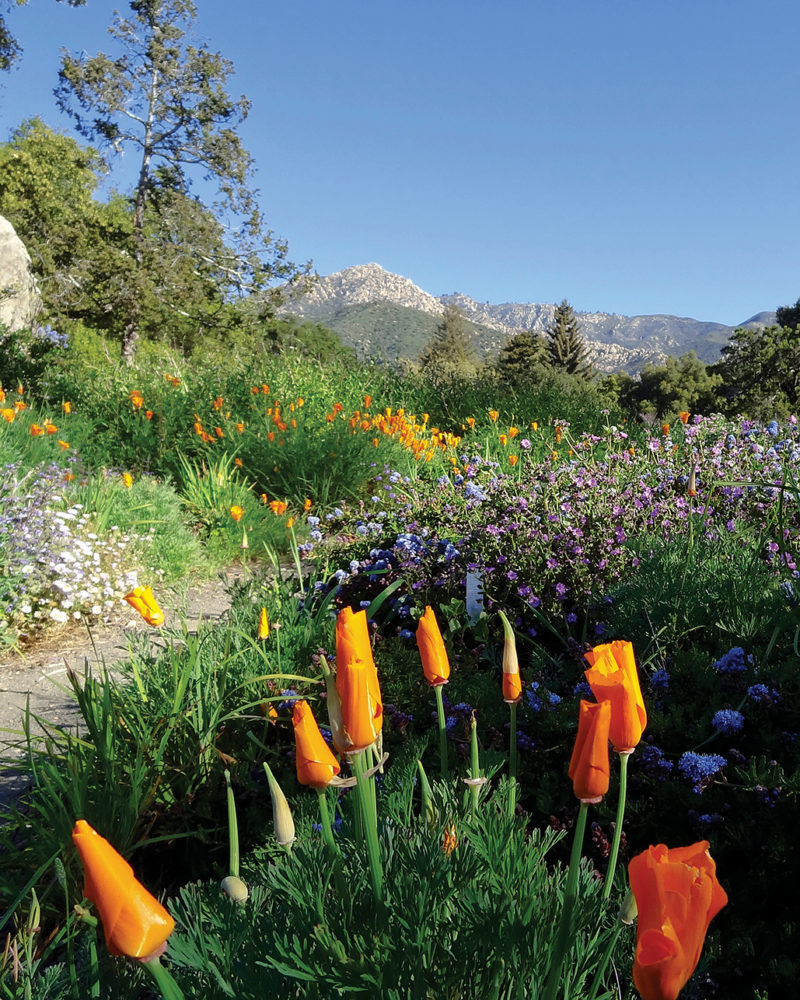 Holly Shimizu, former executive director of the U.S. Botanic Garden and an AHS Board member, explains that through the Garden’s applied research in sustainable landscapes and water-wise planning/design in built landscapes, they introduced “over 30 California native plants cultivars and selections to the horticultural trade… In addition, their research on habitat restoration and pollinator networks has positioned the Garden as a regional leader in applied ecology…”
Holly Shimizu, former executive director of the U.S. Botanic Garden and an AHS Board member, explains that through the Garden’s applied research in sustainable landscapes and water-wise planning/design in built landscapes, they introduced “over 30 California native plants cultivars and selections to the horticultural trade… In addition, their research on habitat restoration and pollinator networks has positioned the Garden as a regional leader in applied ecology…”
Through sustainable garden features, the Garden captures thousands of gallons of rainwater every year that is used for irrigation. Solar energy also provides 70 percent of the power needed at their LEED-certified Pritzlaff Conservation Center.
To support sustainable gardening practices to local and regional home gardeners, the Garden retails native plants in its nursery and provides hands-on educational programs on using native plants in gardening. They are also researching how planting natives enhances the quality of life in communities.
MERITORIOUS SERVICE AWARD
Recognizes outstanding service and generosity in support of the American Horticultural Society and sustainable gardening. First awarded in 1980.
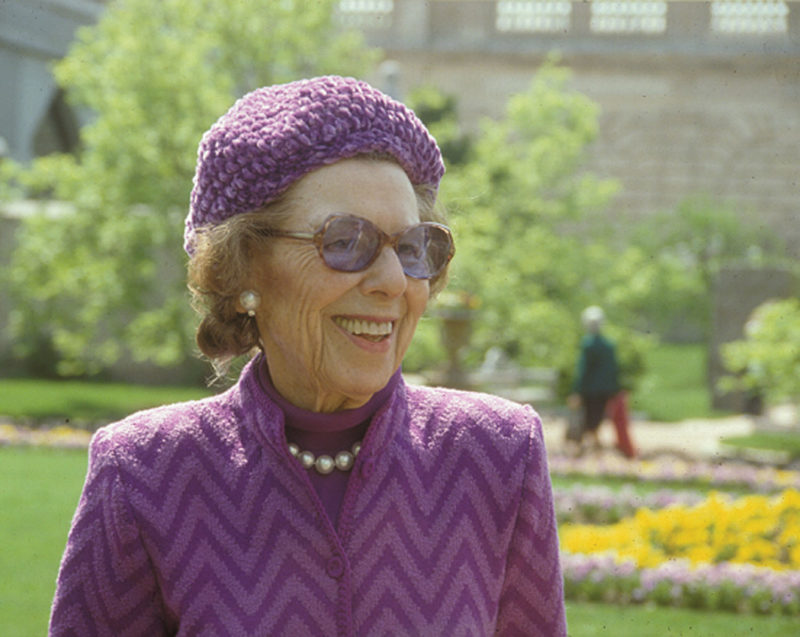
The Society’s Meritorious Service Award honors the late Enid A. Haupt (1906–2005), a philanthropist and publisher whose generosity benefited numerous gardening, cultural, and medical research causes. It was Haupt’s $1 million donation to the American Horticultural Society (AHS) in 1973 that allowed the Society to purchase River Farm as its permanent headquarters. Born in Chicago, Haupt was the daughter of publishing magnate Moses Annenberg. She was publisher of the magazine Seventeen for 18 years before turning her focus to philanthropy. In addition to the AHS, recipients of her love of horticulture included the New York Botanical Garden, the Smithsonian Institution Gardens in Washington, D.C., the Lady Bird Johnson Wild Flower Center in Austin, Texas, and the gardens around the Metropolitan Museum of Art in New York City.
B.Y. MORRISON COMMUNICATION AWARD
Recognizes effective and inspirational communication – through print, radio, television, and/or online media – that advances public interest and participation in horticulture. First awarded in 1987.
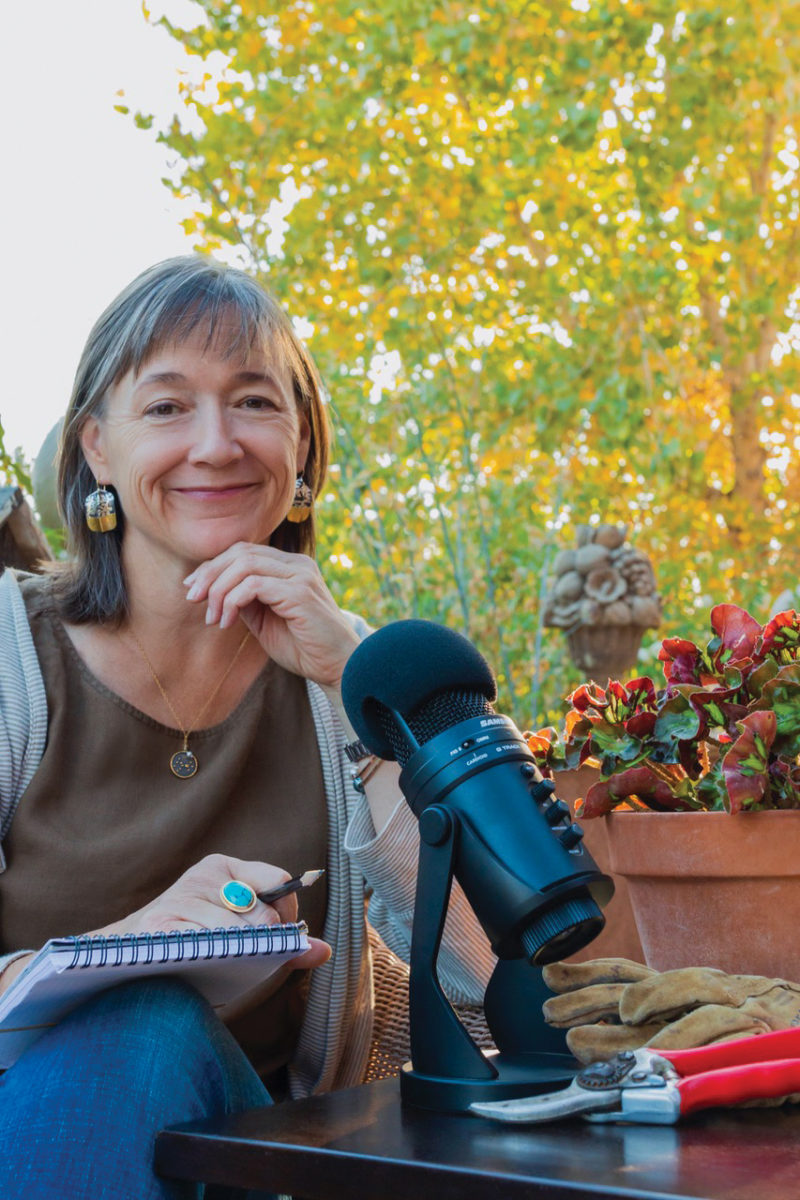
Jennifer Jewell is the creator and host of the acclaimed national weekly public radio program and podcast Cultivating Place: Conversations on Natural History and the Human Impulse to Garden, a coproduction of Northstate Public Radio, in Chico, California, in which she interviews a broad range of personalities in horticulture, from plant explorers to artists, scientists, and landscape designers. According to Jewell, “gardens and gardening are integral to our natural and cultural literacy—on par with Art, Science, Literature, Music, Religion.” Launched in 2016, the podcast received the 2017 Gold Award for Best Overall Broadcast Media from the Garden Writers Association (now GardenComm). Jewell was recognized as the Best On-Air Talent in both 2017 and 2018 by the same organization.
A resident of Northern California with a degree in literature from Harvard, Jewell is also the author of The Earth in Her Hands, 75 Extraordinary Women Working in the World of Plants (Timber Press, 2020), winner of the Council on Botanical & Horticultural Libraries 2021 Award of Excellence in Biography, and Under Western Skies, Visionary Gardens from the Rockies to the Pacific Coast (Timber Press, 2021). Her third book, What We Sow: On the Personal, Ecological, and Cultural Significance of Seeds, will be published later this year.
A recognized speaker at national horticultural events, Jewell’s greatest passion is elevating the way we think and talk about gardening, the empowerment of gardeners, and the possibility inherent in the intersection between environments, cultures, individuals, and the gardens that bring them together beautifully, “for the better of all the lives on this generous planet.” When she is not on the air or on the road, she makes her hiking and gardening life with her partner, plantsman John Whittlesey.
JANE L. TAYLOR AWARD
Given to an individual, organization, or program that has inspired and nurtured future horticulturists through efforts in children’s and youth gardening. First awarded in 2000.
Michael Craig is a special education teacher and horticulture program instructor at the Charles R. Drew Transition Center in the Detroit Public Schools Community District (DPSCD) in Michigan, where he runs and supervises the Gardens at Drew. The Center is a postsecondary vocational school for adult students who have moderate to severe cognitive deficits. He founded the program eight years ago to help students gain functional independence, a purpose and connection within society, and possible future employment in horticulture. 
The Gardens serve as a national model of excellence. Through Craig’s carefully designed interactive teaching methods and curriculum, students learn every step of the horticulture process, from planting and management to harvest and retail sale. The student-grown produce is available at a low cost for students, families, and the local community at the on-site school farm stand.
Craig also initiated a partnership with Michigan State University’s School of Agriculture to research, recommend, and integrate a Science/Food Nutrition/School Horticulture curriculum to support school garden programs and gardening curricula at 82 DPSCD elementary and middle schools. He oversees the program to ensure the schools continue to receive materials, supplies, and supplemental science curriculum components for their school garden programs.
He also successfully applied for a major grant to create a therapeutic sensory butterfly garden that helps special needs students overcome the many triggers that negatively affect their learning capabilities.
“Michael is uniquely talented, highly qualified and immensely dedicated to improving the quality of life for special needs individuals,” says Robert Avedisian, principal of the Drew Center. “He has become a leading fixture in the greater Detroit food community, a source of inspiration to program visitors from across the country, and a provider of food for our community, one that is sorely in need.”